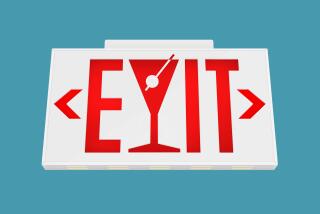PORTRAIT OF AN ADULT CHILD OF AN ALCOHOLIC
- Share via
Jean, who lives in Santa Ana, is 53 years old, married and the mother of four sons. Four years ago, she began discovering and dealing with the lingering scars of growing up with an alcoholic father.
“I always knew my father was an alcoholic, but I didn’t realize how much it had affected me. We just didn’t have a normal home. I knew that, but I didn’t want to face it.
“He was violent. He beat my mother, and he was always extremely critical. I don’t remember any sign of affection or praise from him, nothing positive the whole time I was growing up. I do remember that he didn’t come to my high school graduation. That was just the final blow for me, total rejection.
“When the holidays come around, I try to look back at the family that I grew up in, and I don’t really remember a ceremony of Christmas. I know we must have done something, but I don’t remember what it was. A lot of stuff is still buried in me.
“My priest was the one who referred me to therapy. At the time, there were a lot of contradictions in my life. I was unhappy, depressed, but I really had no reason. I had a loving husband, a nice home, wonderful kids. Yet I wasn’t happy, and I really didn’t know why. It was really hard to explain, even to my family. It’s almost like, unless you have experienced it, you can’t understand.
“I think I decided maybe I needed to take some responsibility, at least for my own behavior. Adult children (of alcoholics) always want to control things, and I tried to have my family conform to my expectations. When that didn’t happen, finally I decided it must be me.
“It was very, very hard at first. I’d go to my support group and think, ‘What am I doing here? This is making me feel worse.’ Something someone would say would trigger some memory or pain, and I would say, ‘I have to get out of here.’ And I would leave the room.
“I must have suppressed my feelings a lot as a child because tears come easily now. I remember a man who used to munch on pretzels, and he would just keep munching. Now I understand. I’ve seen him since, seen him cry, and I understand that that was his defense.
“Now I remember that when I was a child if I started to have fun, I stopped myself. Sometimes I could feel myself laughing, and I’d say to myself, ‘Stop, you’re going to have to pay for this.’ And I stopped.
“Most of my adult life, I figured I was OK. I was shy, reserved, really. But I always felt considerably different from everyone else, and I didn’t know why. I always felt that if anything went wrong, it was my fault.
“I haven’t yet gotten over the grief, the feeling of loss. I lost my childhood. But at least I can no longer pretend that time did not exist. Until three or four years ago, I did. Perhaps in time I will feel like I have recovered.
“My father’s 82 now, and he’s dying in a convalescent hospital, from alcoholism. Have I forgiven him? There’s nothing to forgive him for. He has a disease. But I hated him. Now I hate the disease, not my father.
“Even though it’s not easy, it’s good to face the past. There are so many things that are different for me now. Before, when someone would compliment me, I didn’t know how to react. But then I started to be really comfortable saying, ‘Thank you.’


